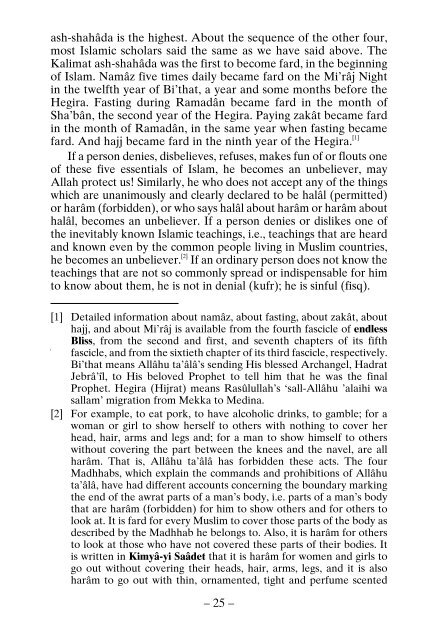Belief and Islam
BELIEF AND ISLAM star This work, Belief and Islam, originally was written in Persian under the title I’tiqâd-nâma by Hadrât Mawlânâ Khâlid al-Baghdâdî, a profound ‘âlim of Islam and a specialist in ma’ârif of tasawwuf. Hâji Faydullah Effendi of Kemah, a khalîfa of great walî Mavlânâ Mahmûd Sâhib, the brother of the author, translated the book into Turkish and named it Farâid-ul-fawâid which was printed in Istanbul in 1312 A.H.[1894]. Our bookstore had it translated again from the Persian original into Turkish and, some explanations and three chapters, published it with the title Imân ve Islâm in 1966. German, French and Arabic versions are also published by our bookstore. This book, explains five fundamentals of Islam, six fundamentals of îmân and the contemporary information about the matter and refutes those who are against Islam and those who are lâ-madbhabî.
BELIEF AND ISLAM
star This work, Belief and Islam, originally was written in Persian under the title I’tiqâd-nâma by Hadrât Mawlânâ Khâlid al-Baghdâdî, a profound ‘âlim of Islam and a specialist in ma’ârif of tasawwuf. Hâji Faydullah Effendi of Kemah, a khalîfa of great walî Mavlânâ Mahmûd Sâhib, the brother of the author, translated the book into Turkish and named it Farâid-ul-fawâid which was printed in Istanbul in 1312 A.H.[1894]. Our bookstore had it translated again from the Persian original into Turkish and, some explanations and three chapters, published it with the title Imân ve Islâm in 1966. German, French and Arabic versions are also published by our bookstore. This book, explains five fundamentals of Islam, six fundamentals of îmân and the contemporary information about the matter and refutes those who are against Islam and those who are lâ-madbhabî.
You also want an ePaper? Increase the reach of your titles
YUMPU automatically turns print PDFs into web optimized ePapers that Google loves.
ash-shahâda is the highest. About the sequence of the other four,<br />
most <strong>Islam</strong>ic scholars said the same as we have said above. The<br />
Kalimat ash-shahâda was the first to become fard, in the beginning<br />
of <strong>Islam</strong>. Namâz five times daily became fard on the Mi’râj Night<br />
in the twelfth year of Bi’that, a year <strong>and</strong> some months before the<br />
Hegira. Fasting during Ramadân became fard in the month of<br />
Sha’bân, the second year of the Hegira. Paying zakât became fard<br />
in the month of Ramadân, in the same year when fasting became<br />
fard. And hajj became fard in the ninth year of the Hegira. [1]<br />
If a person denies, disbelieves, refuses, makes fun of or flouts one<br />
of these five essentials of <strong>Islam</strong>, he becomes an unbeliever, may<br />
Allah protect us! Similarly, he who does not accept any of the things<br />
which are unanimously <strong>and</strong> clearly declared to be halâl (permitted)<br />
or harâm (forbidden), or who says halâl about harâm or harâm about<br />
halâl, becomes an unbeliever. If a person denies or dislikes one of<br />
the inevitably known <strong>Islam</strong>ic teachings, i.e., teachings that are heard<br />
<strong>and</strong> known even by the common people living in Muslim countries,<br />
he becomes an unbeliever. [2] If an ordinary person does not know the<br />
teachings that are not so commonly spread or indispensable for him<br />
to know about them, he is not in denial (kufr); he is sinful (fisq).<br />
[1] Detailed information about namâz, about fasting, about zakât, about<br />
hajj, <strong>and</strong> about Mi’râj is available from the fourth fascicle of endless<br />
Bliss, from the second <strong>and</strong> first, <strong>and</strong> seventh chapters of its fifth<br />
fascicle, <strong>and</strong> from the sixtieth chapter of its third fascicle, respectively.<br />
Bi’that means Allâhu ta’âlâ’s sending His blessed Archangel, Hadrat<br />
Jebrâ’îl, to His beloved Prophet to tell him that he was the final<br />
Prophet. Hegira (Hijrat) means Rasûlullah’s ‘sall-Allâhu ’alaihi wa<br />
sallam’ migration from Mekka to Medina.<br />
[2] For example, to eat pork, to have alcoholic drinks, to gamble; for a<br />
woman or girl to show herself to others with nothing to cover her<br />
head, hair, arms <strong>and</strong> legs <strong>and</strong>; for a man to show himself to others<br />
without covering the part between the knees <strong>and</strong> the navel, are all<br />
harâm. That is, Allâhu ta’âlâ has forbidden these acts. The four<br />
Madhhabs, which explain the comm<strong>and</strong>s <strong>and</strong> prohibitions of Allâhu<br />
ta’âlâ, have had different accounts concerning the boundary marking<br />
the end of the awrat parts of a man’s body, i.e. parts of a man’s body<br />
that are harâm (forbidden) for him to show others <strong>and</strong> for others to<br />
look at. It is fard for every Muslim to cover those parts of the body as<br />
described by the Madhhab he belongs to. Also, it is harâm for others<br />
to look at those who have not covered these parts of their bodies. It<br />
is written in Kimyâ-yi Saâdet that it is harâm for women <strong>and</strong> girls to<br />
go out without covering their heads, hair, arms, legs, <strong>and</strong> it is also<br />
harâm to go out with thin, ornamented, tight <strong>and</strong> perfume scented<br />
– 25 –

















